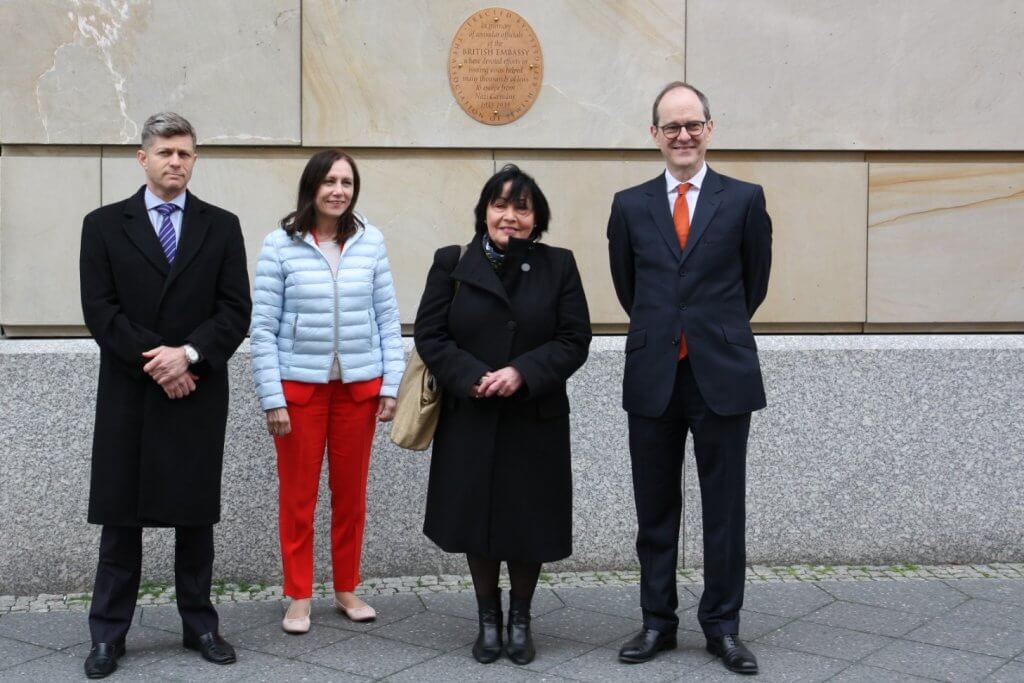AJR’s plaque scheme goes global!
AJR Unveils Commemorative Plaque at the British Embassy in Berlin
The Association of Jewish Refugees (AJR) is delighted to announce the unveiling of a commemorative plaque at the British Embassy in Berlin on Tuesday 12 May, 2020 in dedication and memory of consular officials whose devoted efforts in issuing visas helped many thousands of Jews escape Nazi Germany and Austria during 1933 to 1939.
The plaque was unveiled by the British Ambassador to Germany, Sir Sebastian Wood accompanied by Ambassador Michaela Kuechler, German Special Representative for Relations with Jewish Organizations at the German Ministry of Foreign Affairs. The event was be live-streamed to members of AJR.

From Adolf Hitler’s assumption of power in January 1933 until the outbreak of World War II in September 1939, staff at the British Embassy and Consulate in Berlin and the consulates in other German and, from March 1938, Austrian cities worked to expedite the emigration of Jews from the Third Reich to Britain.
Following the annexation of Austria, Nazi persecution of the Jews prompted such an exodus that in April 1938 the British government introduced a visa system. Visas were issued by the Embassy and Consulate, whereas previously the decision whether or not to admit a refugee to Britain had been taken by immigration officers at the port of arrival. The greatly increased workload fell on the staff of the embassy and consulates, who were frequently guided in their decisions by considerations of common humanity rather than by strict adherence to official guidelines. Thanks to them, some tens of thousands of Jewish refugees were issued with visas that enabled them to emigrate to Britain and in all probability saved their lives.
Sir Sebastian Wood said, “The plaque on the Embassy pays tribute to the bravery and compassion of diplomats such as Frank Foley, Margaret Reid and their staff. It also pays tribute to the many Jewish refugees who escaped Nazi Germany with British visas and re-built their lives in exile. Whenever our common values are threatened, individuals can make a huge difference and, as in this case, save peoples’ lives.”
The Rt Hon Lord Eric Pickles, the UK Special Envoy for Post-Holocaust Issues said: “I am delighted that an AJR plaque is to be unveiled at the British Embassy in Berlin to remember those fearless men and women who at great risk issued visas that saved thousands of Jewish lives. The visas were the difference between life and death. These brave souls never let petty rules get in the way. When the bureaucracy ground to a halt they stepped in to grant visas on the spot. The Association of Jewish Refugees was founded in 1941 by many of those that had fled Germany and Austria on the very visas issued by people like Major Frank Foley and Margaret Reid at the British embassy. Without them, the AJR may never have existed and gone on to serve the Jewish community of Great Britain, as it does today, with pride.”
AJR Trustee, Frank Harding, who devised the commemorative plaque scheme said, “It is a personal honour and the AJR’s great pleasure that we are recognising the heroic work of all those British officials whose actions enabled many thousands of Jews in Germany and Austrian to flee Nazi oppression. Without their diligent work, often going beyond their remit, many more thousands would have perished.
“This will be the 14th plaque in AJR’s commemorative scheme and the first one to be unveiled outside of the UK. Citing the plaque at the British embassy in Berlin is hugely symbolic, especially during the year of Germany’s Chairmanship of International Holocaust Remembrance Alliance (IHRA). It is our great hope that as well as fascinating passers-by, the plaque will help form a tangible link in the story of refugees’ escape from Nazism and the sanctuary they received in Britain. This plaque, along with the others in our scheme, help bring the past into the present and perpetuate the memory of the Holocaust.”
Michaela Küchler, President of IHRA, said: “The history of the Holocaust would be incomplete if it did not tell the history of those who helped. There were those who hid Jews, who provided them with false identities or who issued visas guided by humanitarian convictions rather than by bureaucratic considerations. I am glad the plaque at the British Embassy in Berlin tells their story.”
The British Embassy plaque in Berlin will be added to the interactive map on the AJR website which shows the location of all 14 plaques, with information and photographs about each one.
